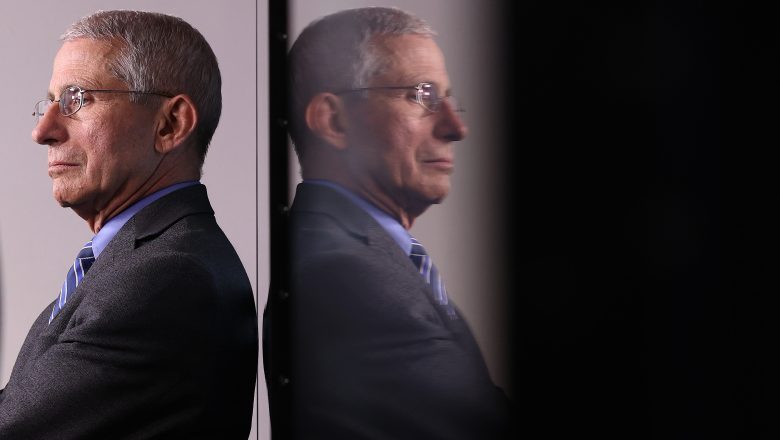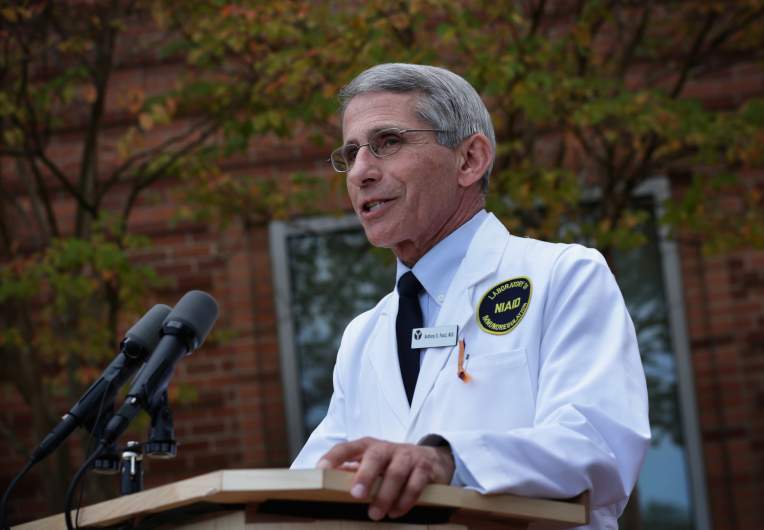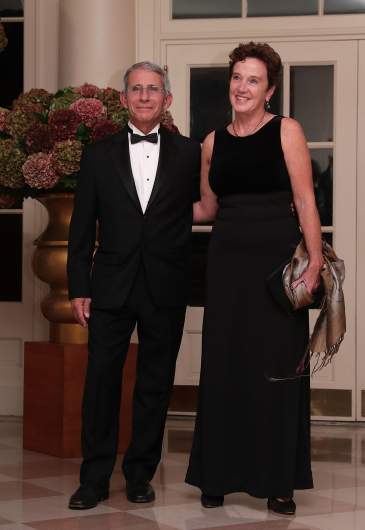
Getty National Institute of Allergy and Infectious Diseases Director Anthony Fauci attends a news briefing following a meeting of the coronavirus task force.
Anthony Fauci is an American immunologist and the head of the National Institute of Allergy and Infectious Diseases (NIAID). As he is one of the leading experts in the U.S. on infectious diseases, he has been a frequent presence in the media in the last few months due to his interviews on the COVID-19 coronavirus.
Fauci has often been seen as a calming figure in the response to the coronavirus and has been a strong advocate for social distancing efforts in the U.S., sometimes in contrast to President Trump’s guidance on reopening the country. Because of this, he has received death threats and was given a personal security detail. In response to this, Fauci said: “You know, it’s my job. This is the life I’ve chosen, and I’m doing it. I mean, obviously there’s a lot of pressure. I would be foolish to deny that. … It’s a job to do, and we’ve just got to do it.”
Although his name is all over the media in recent months, Fauci has been a key figure in the U.S. public health sphere for decades.
Here’s what you need to know about Anthony Fauci:
1. He Has Been Very Direct & Upfront With the Public About the Reality of the Coronavirus & Many Comments Have Contradicted Trump’s
While Trump said that the U.S. would have a shot for coronavirus quite quickly, Fauci said his estimate was that a vaccine wouldn’t be available for a year and a half. While Trump also said that the coronavirus will soon disappear, Fauci shared that he thought the world was on the verge of a pandemic.
In reality, Fauci told Politico that there is a large range in what could happen next: “It could be really, really bad. I don’t think it’s gonna be, because I think we’d be able to do the kind of mitigation. It could be mild. I don’t think it’s going to be that mild either. It’s really going to depend on how we mobilize.”
In a March 8 interview on NBC’s “Meet the Press,” available below, he said there were some missteps with the coronavirus testing early on but their testing capacity is growing quickly now. He also said that elderly people with underlying health conditions should be limiting their travel and their exposure to large crowds. His interview is available here:
In an interview with Politico, Fauci shared the difficulties of advising the president of the U.S. He said: “You should never destroy your own credibility. And you don’t want to go to war with a president,” he continued. “But you got to walk the fine balance of making sure you continue to tell the truth.”
When the White House appointed VP Pence as the coronavirus czar, government health officials and scientists, including Fauci, were asked to get all statements and public appearances cleared by the VP’s office, The New York Times reported. Many said this was an attempt by the government to control or muzzle scientists, but Fauci explained to Politico that he wasn’t being muzzled.
2. He Has Been the Head of NIAID Since 1984 & Was a Central Figure on Global Health Issues Like Ebola, Zika & HIV/AIDS
The 79-year-old has been the head of NIAID for a long time, becoming director in 1984. As the director, he is responsible for a large portfolio of research on established and emerging diseases. According to his NIAID bio, this includes HIV/AIDS, respiratory infections, tuberculosis, malaria, Ebola and Zika. He also oversees research on autoimmune disorders like asthma and allergies.
During the HIV/AIDS crisis, he was one of the central architects of the President’s Emergency Plan for AIDS Relief (PEPFAR). This plan saved millions of lives in the developing world, according to NIAID. He is also responsible for the NIAID budget, which is estimated at about $5.9 billion for the fiscal year 2020.
3. He Was Born in 1940 in New York to a Pharmacist & Attended Cornell University Medical College

Director of the National Institute of Allergy and Infectious Diseases Anthony Fauci on October 24, 2014.
He was born on December 24, 1940, in Brooklyn, New York. His parents were Stephen A. Fauci and Eugenia A. Fauci, who owned a Brooklyn pharmacy together. His father worked as the pharmacist and Fauci helped out by delivering prescriptions. He went to high school in New York City and obtained his M.D. from Cornell University Medical College in 1966. Fauci did his internship and residency with The New York Hospital-Cornell Medical Center.
Fauci is a second-generation Italian who said he used to play basketball in high school “in a tough league with very good people,” he told the Financial Times. He said his medical and research career took a turn in 1981. When AIDS cases started appearing, he decided to study that disease.
4. He Has Many Medical Achievements, Awards & Honors to His Name
Fauci is a highly decorated doctor who has contributed significantly to the understanding of humans’ immune responses. He has also developed therapies that have successfully addressed previously fatal inflammatory and immunity diseases, according to his NIAID biography. The profile also states that Fauci is the 41st most cited researcher of all time.
He has received many awards and honors for his work, most notably the Presidential Medal of Freedom, the highest civilian honor in the U.S. He was given the Presidential Medal of Freedom in 2008 by President George W. Bush for his work on the HIV/AIDS crisis. When President Bush awarded the medal, he said: “For his determined and aggressive efforts to help others live longer and healthier lives, I’m proud to award the Presidential Medal of Freedom to Dr. Anthony S. Fauci.”
He has won dozens of other prestigious awards, received honorary doctorate degrees from 45 universities worldwide and has been involved in over 1,300 scientific publications.
5. He Is Married to a Nurse-Bioethicist & Has Three Daughters

GettyAnthony Fauci and his wife Christine Grady arrive at the White House for a state dinner October 18, 2016.
Fauci married Christine Grady in 1985, a nurse and chief of the department of bioethics with the National Institutes of Health (NIH). In a 2015 profile in the Financial Times of Dr. Fauci, he is quoted as saying his wife “is a triple threat. She went to school to get her PhD in philosophy, worked, and had three children . . . We met over the bed of a patient.” Fauci and his wife Christine have three daughters, all adults, named Jennifer, Megan and Alison.
According to Christine Grady’s profile on the NIH website, she is a nurse-bioethicist and senior investigator serving as the Chief of the Department of Bioethics. Her research focuses on the “ethics of clinical research, including informed consent, vulnerability, study design, recruitment, and international research ethics, as well as ethical issues faced by nurses and other health care providers.”
READ NEXT: Vodka Is Not a Replacement for Hand Sanitizer, CDC Says